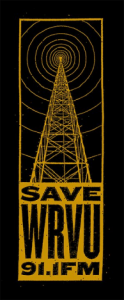 Each and every college radio station facing a potential takeover by an outside group has a unique situation and the twists and turns of the transactions taking place at KTRU, KUSF, and WRVU are evidence of that. In each case, questions have been raised about not only the lack of transparency in these dealings, but also in terms of whether or not the transactions comply with FCC rules, state laws, and each individual university’s policies.
Each and every college radio station facing a potential takeover by an outside group has a unique situation and the twists and turns of the transactions taking place at KTRU, KUSF, and WRVU are evidence of that. In each case, questions have been raised about not only the lack of transparency in these dealings, but also in terms of whether or not the transactions comply with FCC rules, state laws, and each individual university’s policies.
Today the Nashville Scene is reporting that the proposed sale of Vanderbilt’s student radio station WRVU (now known as WFCL after the call letters were secretly changed) could face some scrutiny under Tennessee non-profit law. WRVU is owned by the non-profit Vanderbilt Student Communications (VSC), which is run by a board made up of students and faculty.
The board has always maintained that they are separate from the administration of Vanderbilt University and that they are entitled to sell off the station if they so wish. According to the article, this assumption may not be true if the station makes up the majority of VSC’s assets:
“But perhaps more important is the legal arrangement that binds VSC to Vanderbilt University, giving the school more stake than some of its own officials might have realized in the actions of the student-run body. That, and a decision as to whether WRVU’s broadcast license represents ‘substantially all’ of VSC’s assets, both have the potential to scotch the deal.
In a June 3 letter to Vanderbilt chancellor Nicholas Zeppos and the Vanderbilt Board of Trust…, the nonprofit advocacy group WRVU Friends and Family lays out a provocative argument against the sale. Along with contravening VSC’s stated mission of providing ‘realistic opportunities’ in radio programming for VU students, the letter says, the sale would violate the Tennessee law that governs nonprofit corporations, because the university itself is a member of the VSC but was offered no input on the sale.
…A source close to the Vanderbilt administration tells the Scene that a meeting of ‘top management’ was called on June 17 to discuss the sale, and that officials expressed ‘reason for concern’ regarding Vanderbilt’s relationship with VSC.”
Every since the June 7th shut-down of WRVU‘s terrestrial signal, Save WRVU has been working to fight this pending sale. In the meantime, Nashville Public Radio is utilizing the 91.1FM frequency for classical programming, while the webcast for WRVU is dark. Paperwork has not been submitted to the FCC regarding the sale, so it’s likely that WRVU supporters are hoping that they can persuade VSC and Nashville Public Radio to back out of the deal before the FCC is involved.
***
All Radio Survivor articles about WRVU can be found here. Additionally, I wrote a profile of WRVU on Spinning Indie back in April, 2010. The station’s General Manager at the time spoke about the controversy at the time over new limits on community member involvement at the station.


